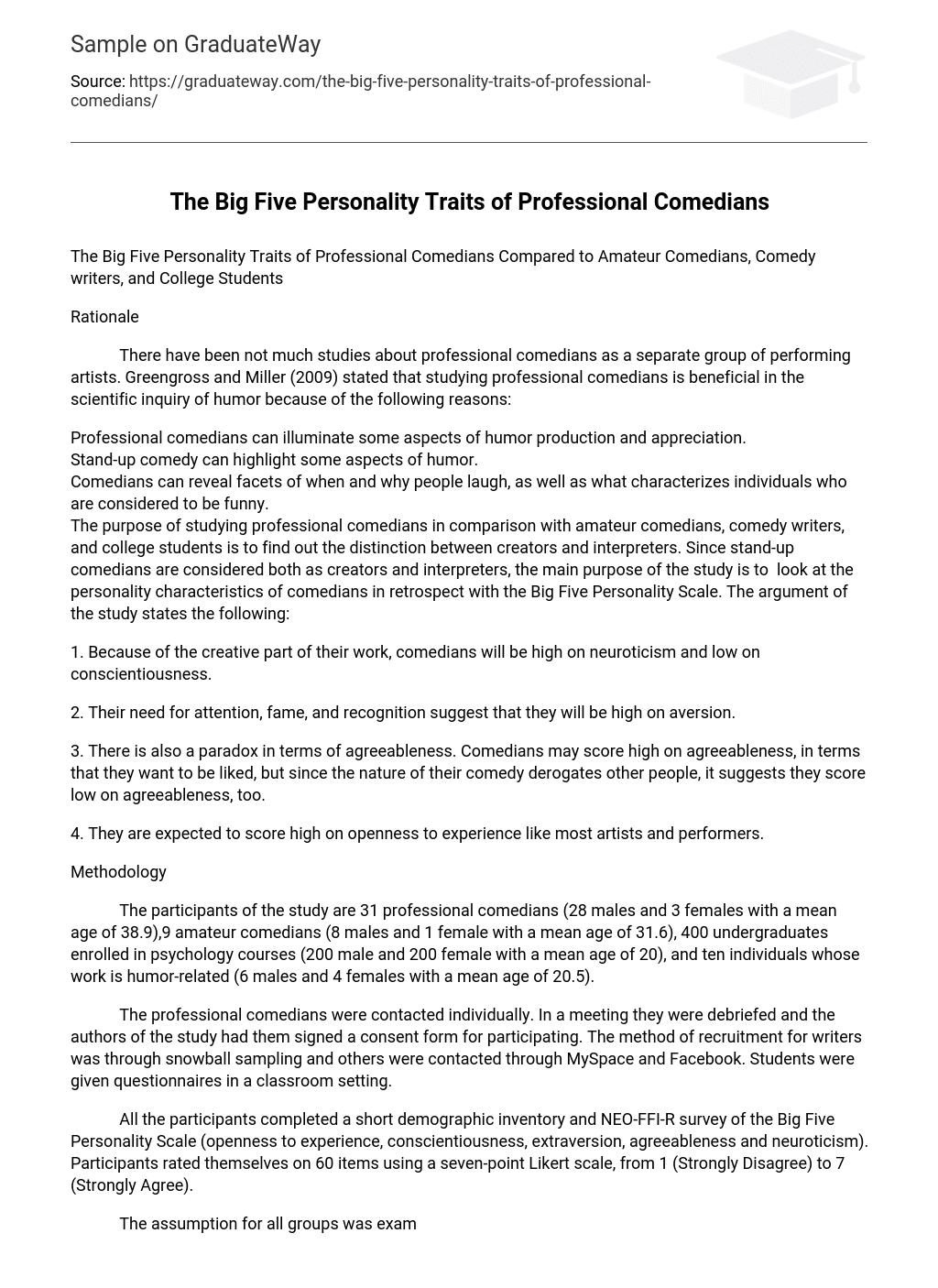Rationale
There have been not much studies about professional comedians as a separate group of performing artists. Greengross and Miller (2009) stated that studying professional comedians is beneficial in the scientific inquiry of humor because of the following reasons:
- Professional comedians can illuminate some aspects of humor production and appreciation.
- Stand-up comedy can highlight some aspects of humor.
- Comedians can reveal facets of when and why people laugh, as well as what characterizes individuals who are considered to be funny.
The purpose of studying professional comedians in comparison with amateur comedians, comedy writers, and college students is to find out the distinction between creators and interpreters. Since stand-up comedians are considered both as creators and interpreters, the main purpose of the study is to look at the personality characteristics of comedians in retrospect with the Big Five Personality Scale. The argument of the study states the following:
- Because of the creative part of their work, comedians will be high on neuroticism and low on conscientiousness.
- Their need for attention, fame, and recognition suggest that they will be high on aversion.
- There is also a paradox in terms of agreeableness. Comedians may score high on agreeableness, in terms that they want to be liked, but since the nature of their comedy derogates other people, it suggests they score low on agreeableness, too.
- They are expected to score high on openness to experience like most artists and performers.
Methodology
The participants of the study are 31 professional comedians (28 males and 3 females with a mean age of 38.9),9 amateur comedians (8 males and 1 female with a mean age of 31.6), 400 undergraduates enrolled in psychology courses (200 male and 200 female with a mean age of 20), and ten individuals whose work is humor-related (6 males and 4 females with a mean age of 20.5).
The professional comedians were contacted individually. In a meeting they were debriefed and the authors of the study had them signed a consent form for participating. The method of recruitment for writers was through snowball sampling and others were contacted through MySpace and Facebook. Students were given questionnaires in a classroom setting.
All the participants completed a short demographic inventory and NEO-FFI-R survey of the Big Five Personality Scale (openness to experience, conscientiousness, extraversion, agreeableness and neuroticism). Participants rated themselves on 60 items using a seven-point Likert scale, from 1 (Strongly Disagree) to 7 (Strongly Agree).
The assumption for all groups was examined using normal probability plots, and because they reveal no variations from normality, Levene’s homogeneity test was conducted. Results reveal that the groups’ variances are not different from each other, so it was safe to continue with ANOVA. To further explore the nature of differences, the researchers calculated Cohen’s d effect sizes for difference scores.
Results
There were significant group differences for openness to experience, extraversion, and conscientiousness, but marginal difference on agreeableness. The overall results reveal the following:
- Openness to Experience- professional comedians scored higher than students but lower than comedy writers.
- Extraversion- professional comedians scored lower in this dimension than both students and comedy writers group.
- Agreeableness- comedians scored lower than comedy writers.
- Conscientiousness- comedians scored low.
- Neuroticism- there were no differences among the groups.
The study’s most surprising finding was that comedians are more introverted than the other groups of participants. The results of this study show that professional comedians share some characteristics with other creators and performers, but are also distinct from each one of them.
Strengths and Weaknesses
The purpose of the study is original. Although there are other studies done to research on professional comedians, this particular one focused on studying their characteristics in contrast with other groups of people. Although, the research’s rationale included the scientific inquiry of humor, and this study failed to achieve that.
One limitation of the study was that there was a big gap in age differences among the participants. Also, there were a few female participants. One more weakness is that the sample of the professional comedians was extremely low in comparison with the number of the other group, which was the college students. Future research could improve the methodology to achieve a more specific result.
Future Studies
The authors suggested that future research explore the differences of comedians and other groups in terms of their work to highlight their differences and similarities. I personally suggest that future studies explore the differences between comedians’ score on the Big Five at the start of their career, when they are amateur comedians still, and their score at the time they become professional comedians, in order to know if there would be differences in the Big Five personality traits as comedians become older and more experienced.
References
- Greengross, G. and Miller, G. (2009). “The Big Five Personality Traits of Professional Comedians Compared to Amateur Comedians, Comedy writers, and College Students.” Personality and Individual Differences. Retrieved from: http://www.elsevier.com/locate/paid





